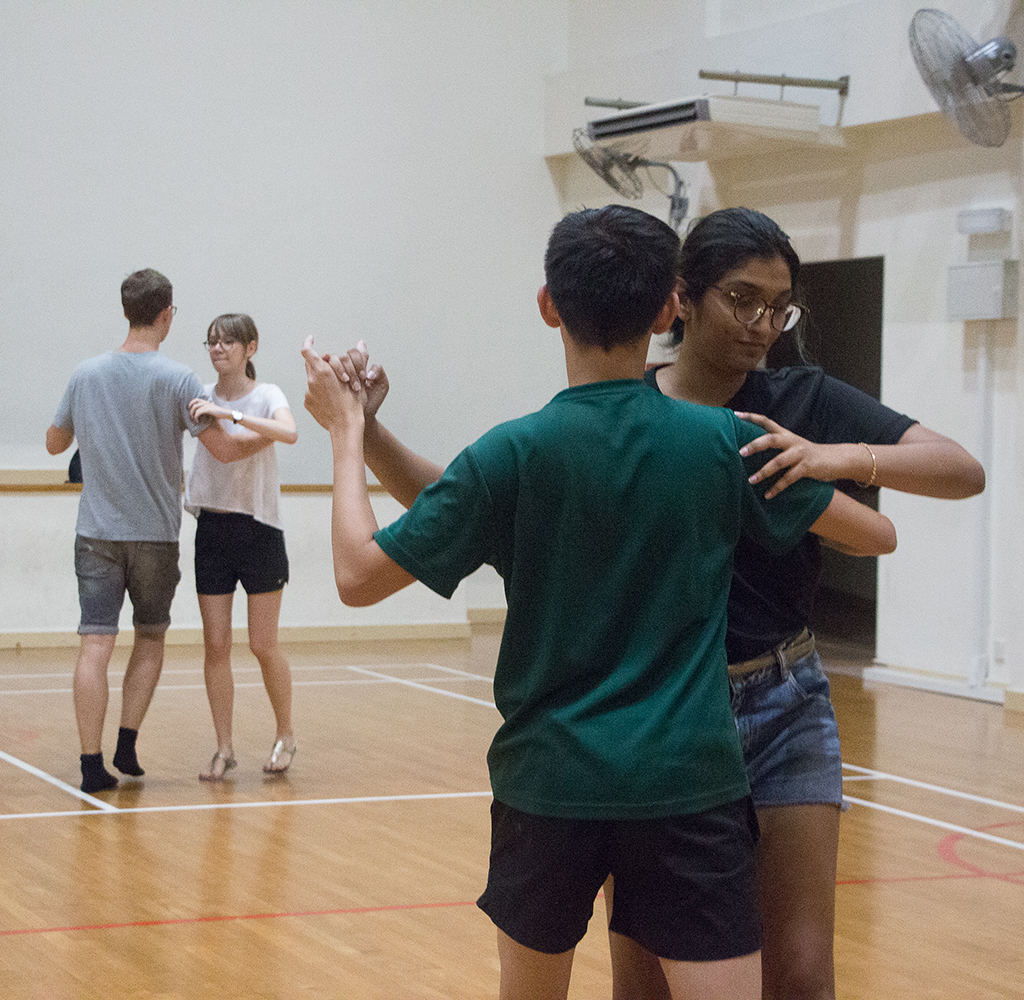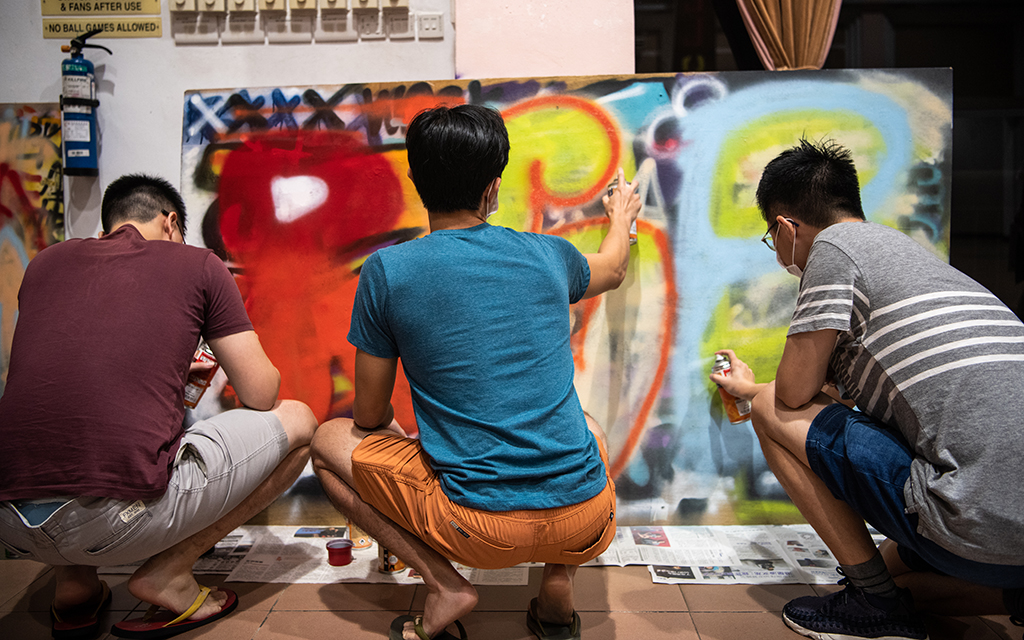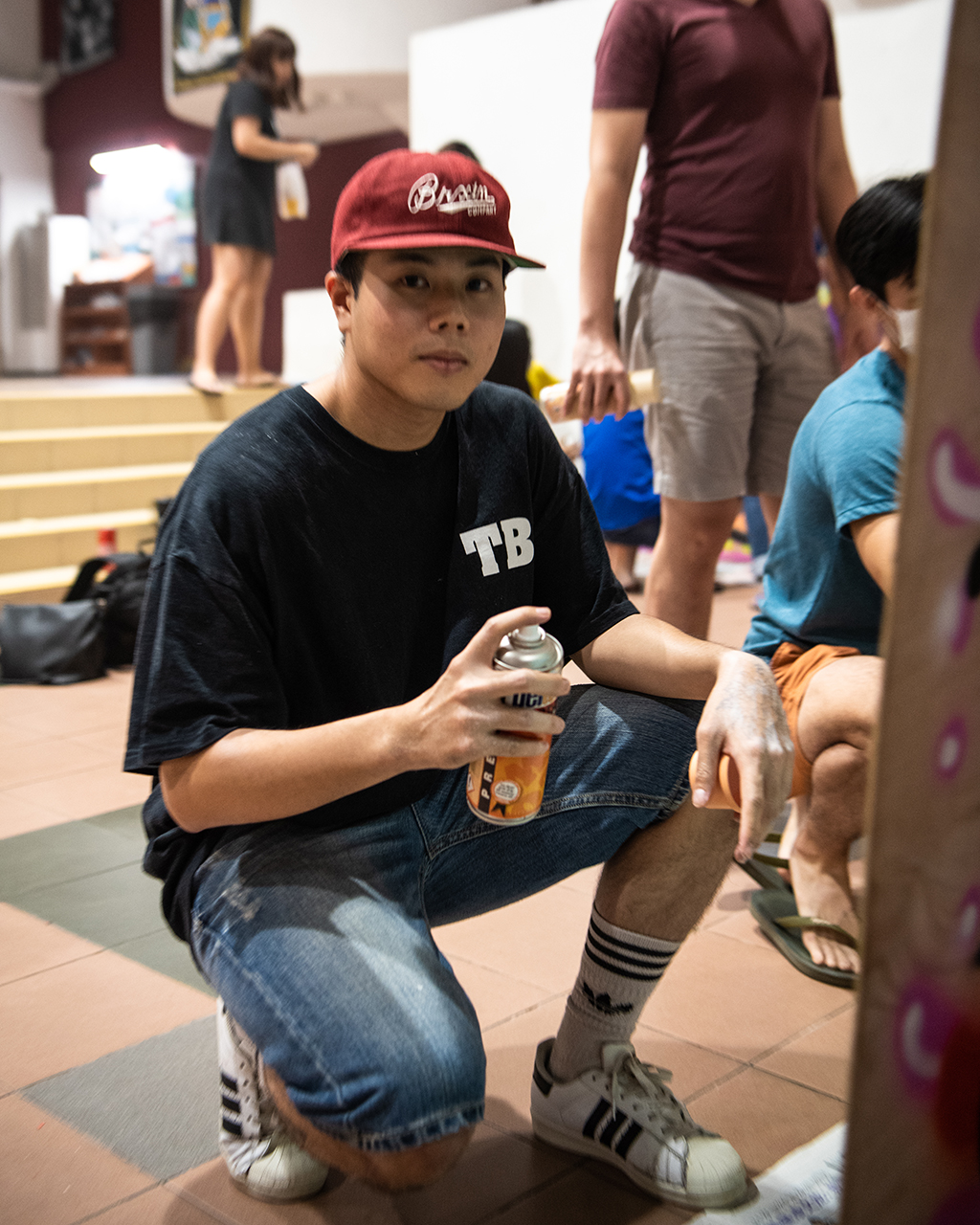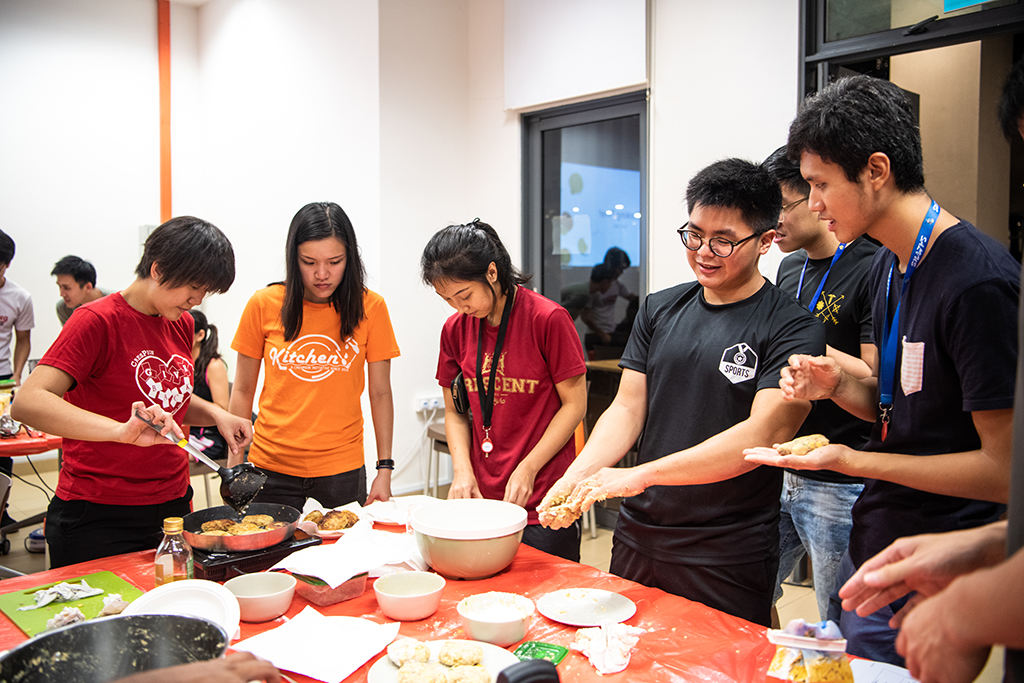Beyond the classrom
5 Nov 2018
By Samantha Koh
 Hall 3 residents taking part in the international standard ballroom and Latin dancing class. The lessons ran for seven weeks this semester, as part of the hall’s Residential Education programme.
Hall 3 residents taking part in the international standard ballroom and Latin dancing class. The lessons ran for seven weeks this semester, as part of the hall’s Residential Education programme.
PHOTO: DEBBIE MICHELLE NG
With his hand placed on the small of his partner’s back, second-year School of Material Science and Engineering student Stanley Koh, 22, waltzed around Hall of Residence 3’s large function area as music played in the background.
When the melody ended, Koh stopped dancing and smiled sheepishly at his partner, before laughing over mistakes they had made during their routine.
Koh has been attending these weekly international ballroom dancing workshops under Hall 3’s Residential Education (RE) programme, which was implemented in his hall this August.
The RE programme, also known as RE@NTU, started in 2014 as part of NTU’s framework to create a holistic education for hall residents.
First implemented in Pioneer and Crescent Halls, RE@NTU was rolled out to the other halls over the last few years, with the latest batch beginning their activities at the start of this semester. Now, there are various activities for residents to choose from, including international standard ballroom and Latin dancing classes, graffiti workshops and cooking lessons.
Step by step
While international standard ballroom and Latin dancing lessons have been offered as hall activities in Hall 3 for more than five years, residential mentors and hall fellows incorporated them formally in the RE programme this year.
Residential mentor Ms Yean Seanglidet, 25, a PhD student at the School of Computer Science and Engineering said: “The dance lessons have always been well-liked by our residents, and we decided to make them a part of our RE programme because they fulfil the goal of promoting learning beyond academics in school.”
There are also some health benefits, as participants can find out how to improve their posture while dancing, she added.
Koh, who has attended all seven dance sessions this semester, said that these classes, being ungraded, allowed him to have more fun than in his other graded modules.
“I was able to increase my exposure to a different area of interest that I would not normally pursue if it wasn’t convenient for me,” he added.
The residential mentors are looking to develop Hall 3’s RE programme further, since it is still in its fledgling stage. Other RE activities in the hall include yoga and CANdroid, an android application development class for beginners.
Sign-up rates have been promising so far — in particular, CANdroid has been very popular among Hall 3’s residents, said Ms Yean.
Although the class can cater up to 30 students, it is heartening that more than 40 students have showed up for it at one point, she added.
More programmes for residents are in the pipeline, she said.
“The RE team hopes to provide students with activities that cover all aspects. As international ballroom dancing and yoga already cover the arts aspect, we’re planning to include activities such as drone photography for the engineering side next semester.”
Changing perspectives through art
 Students spray painting at Hall 8's graffiti workshop, where they were taught different techniques. They were also introduced to the different types of paint and nozzles used for graffiti.
Students spray painting at Hall 8's graffiti workshop, where they were taught different techniques. They were also introduced to the different types of paint and nozzles used for graffiti.
PHOTO: THEODORE LIM
 Mr GC Phan, 26, introduced the graffiti workshop in 2017 because he wanted students to cultivate an interest in street art and hip hop culture.
Mr GC Phan, 26, introduced the graffiti workshop in 2017 because he wanted students to cultivate an interest in street art and hip hop culture.
PHOTO: THEODORE LIM
Meanwhile, Hall 8’s RE programme, known as AR+BACK, began in 2016 and includes artistic workshops such as videography and hip hop lessons.
AR+BACK aims to combine art and giving back to the community, said Mr GC Phan, 26, a residential mentor and PhD student from the School of Physical and Mathematical Sciences.
After attending workshops in hall, residents visit non-profit organisations such as Boys’ Town and Lakeside Family Services to teach youths how to film videos and dance hip hop, he added.
This semester, a two-hour-long graffiti workshop held in October was one of the highlights of the programme.
With spray cans in hand, 30 residents split into smaller groups in Hall 8’s communal hall and began spray painting letter decorations and blending different colours on plain boards.
Others chose to express their creativity by freestyling and spray painting simpler designs like flowers and their own names.
The graffiti workshop was first introduced in 2017 by Mr Phan, who wanted to teach students something that they could not learn in school. Graffiti also helped him stay on the straight and narrow when he was growing up, and was therefore significant to him, he said.
“I hope that students will cultivate an interest in street art through this workshop. A passion for the arts changed my perspective in life when I was younger, and helped me to stay away from bad activities and study hard,” he said.
During the graffiti workshop, residents learnt basic spray painting techniques, with some becoming more adept at it than others.
Final-year School of Mechanical and Aerospace Engineering student Gerald Eng, said: “It is harder than it looks. A spray can is hard to control and it was difficult to get the effect that I had in mind.”
Nonetheless, the 25-year-old was glad to have the chance to learn how to create graffiti art.
“I always found graffiti interesting and wanted to find out more about the story behind it but I never had the chance to do so. It is rare to come across such an opportunity in school.”
More than a dish
 Residents of Pioneer and Crescent Halls learn how to cook easy recipes during the cooking workshop.
Residents of Pioneer and Crescent Halls learn how to cook easy recipes during the cooking workshop.
PHOTO: THEODORE LIM
Some halls, such as the Pioneer and Crescent Halls, have been collaborating to hold activities related to the arts, engineering and soft sciences like biology for the past four years.
Director of student experiential learning and senior faculty-in-residence for Pioneer hall, Dr Sze Chun Chau, 48 said: “We wanted to make sure that our RE programme covered as many disciplines as possible as we did not want it to serve only a select group of students.”
The two halls, which are the pioneers of the RE programme, have organised various activities ranging from jar cake-making to filmmaking workshops over the years.
This year, they introduced
Food for Thought, a two-hour-long cooking workshop that aims to encourage students to reduce food wastage and cook their own dishes instead of eating out.
Ms Sint Thida Bo, 25, a Pioneer Hall residential mentor and PhD student from the School of Biological Sciences, said: “We wanted to teach students that cooking is not difficult and that they can reduce food wastage by choosing only the ingredients that they want to eat.”
When students eat in canteens, they often waste food by removing ingredients that they do not like in their dishes, she added.
During the workshop, students learnt how to cook nutritional dishes such as pan-fried potato patties and ginger-infused honey chawanmushi. None of the ingredients went to waste, with leftovers like eggs being used to make omelettes.
The 15 participants tasted their own dishes and finished the food together at the end of the class.
First-year National Institute of Education student Lim Zhi Qi, 19, said: “I am interested in cooking and
Food for Thought was a convenient opportunity to learn as I don’t have the time to learn how to cook outside of school.”
Now that she knows how to whip up these easy recipes, she will be putting what she has learnt into practice at home, she added.
Besides learning how to cook, some students said the workshop was a good way to get to know their fellow residents.
“I signed up because I liked the idea of community cooking as it is a good way to destress and bond with people after school,” said Marcus Lau, a first-year National Institute of Education student.
The 23-year-old was grouped with other residents whom he had never met before, but he worked well with them, he said.
“It was fun getting the chance to work with people from different faculties to cook and create dishes.”





